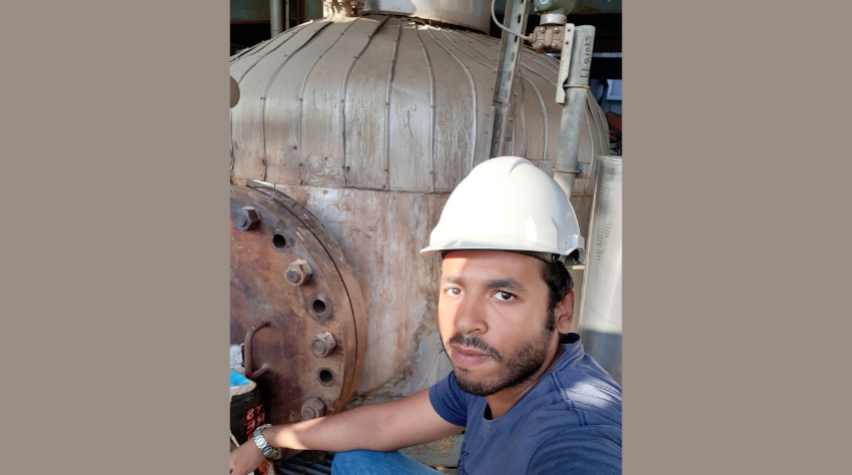
Welcome to the latest in a series of AIChE blog posts profiling process engineers, a diverse group of professionals spanning multiple industries and regions. In this series, we profile process engineers who work in a wide range of fields, including petrochemicals, pharma, bulk chemicals, food, and other process-intensive industries.
Are you a member and process engineer interested in being profiled? We’d love to hear from you via this volunteer opportunity. Please also check out our online discussion group specifically for process engineers. You can find out about these initiatives and join our efforts by visiting aiche.org/process-engineers.
This month, we introduce you to Amr Saber Awad, former Process Engineer at TCI Sanmar and current Process Safety & Loss Prevention Engineer at Petroleum Pipelines Company (PPC). He discusses the path that led to his career in process engineering, overcoming challenges, and the importance of his work.
Tell us a bit about your work as a process engineer.
Working as a process engineer in a chemical plant is all about maintaining a smooth and steady operation. In doing so, I found myself exploring many aspects of my role as a process engineer, from understanding the design features and specs of different equipment, to understanding how they operate, and tying everything together to maintain a steady, optimized, and efficient operation.
Moreover, I've had the opportunity to engage with all the departments (Mechanical, Electrical, Instrumentation, Safety, etc.), which has enriched my knowledge and allowed me to acquire new soft skills in team management, effective communications, collaboration, and data-based decision making.
Why did you become a process engineer?
My ambition was specifically focused on creating new processes or revamping old ones, and having the chance to add more value to the industrial sector. I have always thought the best career a chemical engineer can aspire to would utilize their knowledge of science, applied on an industrial scale.
However, once I started my job, I saw things from a different and broader perspective. I realized that chemical engineering wasn’t encompassed only in being a process engineer; its real focus was less process oriented and more human oriented.
What are some of the biggest challenges you’ve faced in your role as a process engineer?
Technically speaking, I was fully prepared for my role as a process engineer, but I had a rough start. From the first day of work, I was assigned to a multi-disciplinary team responsible for figuring out how to optimize the process to decrease steam/natural gas usage in order to reduce utilities costs.
I excelled at addressing the the technical details by using a low-boil byproduct as an alternative fuel source for the furnace, after validating the compatibility of the furnace’s burner to the new fuel source. I also diverted the excess steam to the waste heat boiler (closed loop), resulting in a significant reduction of low-pressure steam.
However, the challenge was convincing older and more experienced team members that my solution was feasible. In order to do this, I utilized soft skills such as communication, empathy, collaboration, and persuasion. These skills proved to be more important than simply having technical skills because in the real world, you and your ideas are only as good as your team.
How is your work as a process engineer critical to your particular job assignment or industry?
My work as a process engineer was extremely critical at my previous job because the plant was old and had many problems that resulted from either process disturbances or equipment failure. So, I had to have real-time monitoring on all operating conditions to help with troubleshooting. I had to provide a solid explanation of the problem’s causes, effects, and how to either eliminate or minimize it.
In having to address these critical demands, I came across the very intriguing, interesting and relatively new field which is process safety. The field addresses exactly what my position demanded: the elimination or minimization of major events that might lead to catastrophic accidents. Although process safety wasn’t fully implemented in my company, my interest continued to grow until I eventually shifted my primary focus to the safety of processes with respect to the individual and environment, and with the goal of preserving surroundings and assets.
What do you think is most important about your work as a process engineer?
Although at first, I was deeply passionate about creating and designing new processes, I learned that preserving the process’s efficiency and steady operation is much more difficult, as you’re dealing with much more complex variables and parameters that must be addressed at once to ensure the safety of the workers, environment, and assets, along with the safe operation of the plant, and continuity of production.
In addition, I became more enlightened about my role in leading, and I learned how to utilize every individual’s potential, knowledge, and skills to increase our performance and keep improving. I also learned when to follow, and when to share my expertise.
Connect with Amr on AIChE Engage
Join the Community of Process Engineers
The Community of Process Engineers is brought to you by Scott & Karen Love. Their support enables the AIChE Foundation to advance process engineers at every stage of their career allowing them to Do a World of Good.
AIChE Foundation – Doing a World of Good Campaign

If you are interested in learning more about professional development, networking, and interviewing, be sure to check AIChE Career DiscoveryTM, which is part of the Institute for Learning & Innovation (ILI). See upcoming instances of the Career Discovery Workshop on AIChE Academy and read more about the process here.
Learn more about professional development


